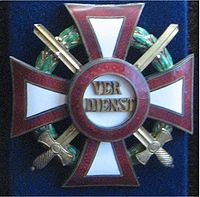Military Merit Cross (Austria-Hungary)
| Military Merit Cross (Militärverdienstkreuz) | |
|---|---|

Military Merit Cross 1st Class with Swords
|
|
| Awarded by Austria-Hungary | |
| Type | Decoration in three grades |
| Eligibility | Military officers only |
| Awarded for | Military merit and valor |
| Status | obsolete |
| Statistics | |
| Established | October 22, 1849 |
| Precedence | |
| Next (higher) | Order of the Iron Crown |
| Next (lower) | War Cross for Civil Merits |
|
Ribbon of the medal |
|
The Military Merit Cross (German: Militärverdienstkreuz, Hungarian: Katonai Érdemkereszt, Croatian: Vojni križ za zasluge) was a decoration of the Empire of Austria and, after the establishment of the Dual Monarchy in 1867, the Empire of Austria-Hungary. It was first established on October 22, 1849 and underwent several revisions to its design and award criteria over the years of its existence. It became obsolete in 1918 with the dissolution of the Austro-Hungarian Empire.
The Military Merit Cross was established on October 22, 1849 by Emperor Franz Joseph I, based on the recommendation of Field Marshal Count Radetzky. It was to be awarded to officers who had performed especially praiseworthy service before the enemy in wartime, or outstanding service in peacetime, and was originally established in only one class.
The first awards were made to all officers who had served under Count Radetzky in the Italian campaigns of 1848-49, especially the Battle of Custoza in 1848 and the Battle of Novara in 1849. Just under 1,500 awards were made in 1849 and 1850, mainly to these officers. After this, the Military Merit Cross was awarded sparingly except during the Austro-Sardinian War of 1859, the German-Danish War of 1864, the Austro-Prussian War of 1866, the Russo-Turkish War of 1877–1878 (when Austria occupied Bosnia-Herzegovina), and the Boxer Rebellion.
...
Wikipedia
